倒装句例句
文言文倒装句的四种基本句型例句
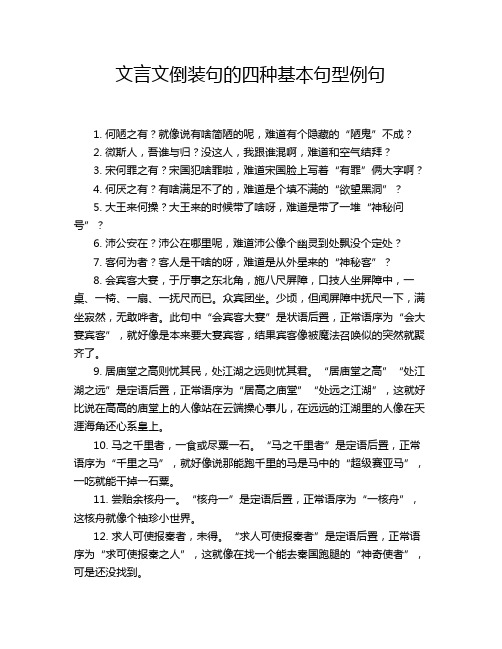
文言文倒装句的四种基本句型例句1. 何陋之有?就像说有啥简陋的呢,难道有个隐藏的“陋鬼”不成?2. 微斯人,吾谁与归?没这人,我跟谁混啊,难道和空气结拜?3. 宋何罪之有?宋国犯啥罪啦,难道宋国脸上写着“有罪”俩大字啊?4. 何厌之有?有啥满足不了的,难道是个填不满的“欲望黑洞”?5. 大王来何操?大王来的时候带了啥呀,难道是带了一堆“神秘问号”?6. 沛公安在?沛公在哪里呢,难道沛公像个幽灵到处飘没个定处?7. 客何为者?客人是干啥的呀,难道是从外星来的“神秘客”?8. 会宾客大宴,于厅事之东北角,施八尺屏障,口技人坐屏障中,一桌、一椅、一扇、一抚尺而已。
众宾团坐。
少顷,但闻屏障中抚尺一下,满坐寂然,无敢哗者。
此句中“会宾客大宴”是状语后置,正常语序为“会大宴宾客”,就好像是本来要大宴宾客,结果宾客像被魔法召唤似的突然就聚齐了。
9. 居庙堂之高则忧其民,处江湖之远则忧其君。
“居庙堂之高”“处江湖之远”是定语后置,正常语序为“居高之庙堂”“处远之江湖”,这就好比说在高高的庙堂上的人像站在云端操心事儿,在远远的江湖里的人像在天涯海角还心系皇上。
10. 马之千里者,一食或尽粟一石。
“马之千里者”是定语后置,正常语序为“千里之马”,就好像说那能跑千里的马是马中的“超级赛亚马”,一吃就能干掉一石粟。
11. 尝贻余核舟一。
“核舟一”是定语后置,正常语序为“一核舟”,这核舟就像个袖珍小世界。
12. 求人可使报秦者,未得。
“求人可使报秦者”是定语后置,正常语序为“求可使报秦之人”,这就像在找一个能去秦国跑腿的“神奇使者”,可是还没找到。
13. 遂率子孙荷担者三夫。
“子孙荷担者”是定语后置,正常语序为“荷担之子孙”,就好像是挑着担子的子孙像一群勤劳的小蚂蚁。
14. 通计一舟,为人五;为窗八。
“为人五”“为窗八”是定语后置,正常语序为“为五人”“为八窗”,这就像说舟里的五个人像五个小精灵,八个窗户像八只小眼睛。
15. 且焉置土石?而且把土石放在哪里呢,难道要把土石像扔垃圾一样随便丢吗?16. 甚矣,汝之不惠!你的不聪明也太严重了,就像脑袋里灌了一吨的浆糊。
地点状语放句首的倒装句

地点状语放句首的倒装句
地点状语放句首的倒装句是英语语法中比较常见的一种句型。
倒装句的基本形式是将谓语动词的一部分提前到主语前面,以达到强调的效果。
当地点状语放在句首时,为了突出地点的重要性,倒装句的使用更为普遍。
例如:
1. In the corner of the room sat a large, black chair. (房间的角落里坐着一把大黑椅子。
)
2. On top of the mountain stands a beautiful temple. (山顶上矗立着一座美丽的寺庙。
)
3. Down the street came a group of children, laughing and shouting. (沿着街道走来一群孩子,笑着喊着。
)
在这些句子中,地点状语都被放在了句首,谓语动词也随之倒装,使得句子更加生动有力。
需要注意的是,当句子中还有其他状语时,地点状语要放在其他状语之前,如:
4. In the park yesterday afternoon, a young couple was having a picnic. (昨天下午在公园里,一对年轻夫妇在野餐。
) 在这个例子中,地点状语'in the park'是放在时间状语
'yesterday afternoon'之前的,这样能够更清晰地表达出句子的时间和地点。
- 1 -。
英语倒装句12种类型及例句
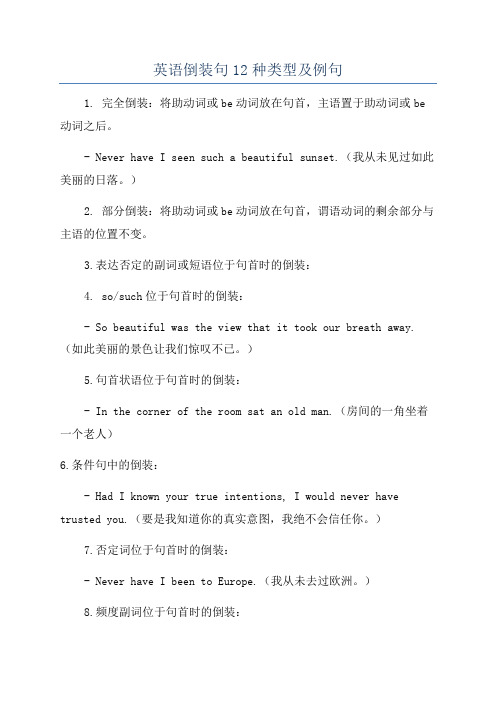
英语倒装句12种类型及例句1. 完全倒装:将助动词或be动词放在句首,主语置于助动词或be 动词之后。
- Never have I seen such a beautiful sunset.(我从未见过如此美丽的日落。
)2. 部分倒装:将助动词或be动词放在句首,谓语动词的剩余部分与主语的位置不变。
3.表达否定的副词或短语位于句首时的倒装:4. so/such位于句首时的倒装:- So beautiful was the view that it took our breath away.(如此美丽的景色让我们惊叹不已。
)5.句首状语位于句首时的倒装:- In the corner of the room sat an old man.(房间的一角坐着一个老人)6.条件句中的倒装:- Had I known your true intentions, I would never have trusted you.(要是我知道你的真实意图,我绝不会信任你。
)7.否定词位于句首时的倒装:- Never have I been to Europe.(我从未去过欧洲。
)8.频度副词位于句首时的倒装:- Rarely do we see such dedication.(我们很少见到如此的奉献精神。
)9.祈使句或祈使句部分的倒装:- Stand up!(站起来!)- Be quiet, please.(请安静。
)10. only位于句首时的倒装:- Only by working hard can you achieve your goals.(只有通过努力工作,你才能实现目标。
)11.地点状语置于句首时的倒装:- In the garden were beautiful flowers.(花园里有美丽的花朵。
)12.宾语置于句首时的倒装:- A love like this I have never felt before.(我之前从未感受过如此的爱。
英语倒装句例子
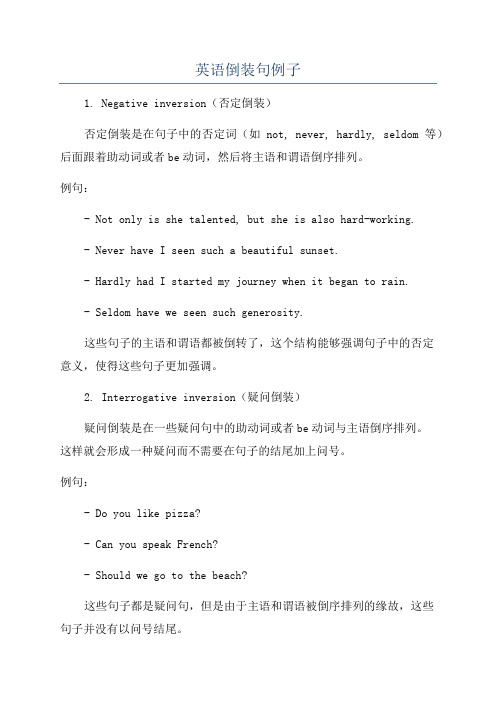
英语倒装句例子1. Negative inversion(否定倒装)否定倒装是在句子中的否定词(如not, never, hardly, seldom等)后面跟着助动词或者be动词,然后将主语和谓语倒序排列。
例句:- Not only is she talented, but she is also hard-working.- Never have I seen such a beautiful sunset.- Hardly had I started my journey when it began to rain.- Seldom have we seen such generosity.这些句子的主语和谓语都被倒转了,这个结构能够强调句子中的否定意义,使得这些句子更加强调。
2. Interrogative inversion(疑问倒装)疑问倒装是在一些疑问句中的助动词或者be动词与主语倒序排列。
这样就会形成一种疑问而不需要在句子的结尾加上问号。
例句:- Do you like pizza?- Can you speak French?- Should we go to the beach?这些句子都是疑问句,但是由于主语和谓语被倒序排列的缘故,这些句子并没有以问号结尾。
3. Adverbial inversion(副词倒装)副词倒装常常出现在一些表达地点或时间的副词(如here, there, now, then, on the front)在句首的情况下。
例句:- There went my chance.- Then came the storm.- On the front are the main headlines.这些句子中的副词被放在句子的最前面,并且主语和谓语被倒序排列了。
4. Emphatic inversion(强调倒装)强调倒装通常强调句子中的某个部分,被强调的部分通常在句首。
英语倒装句12种类型及例句
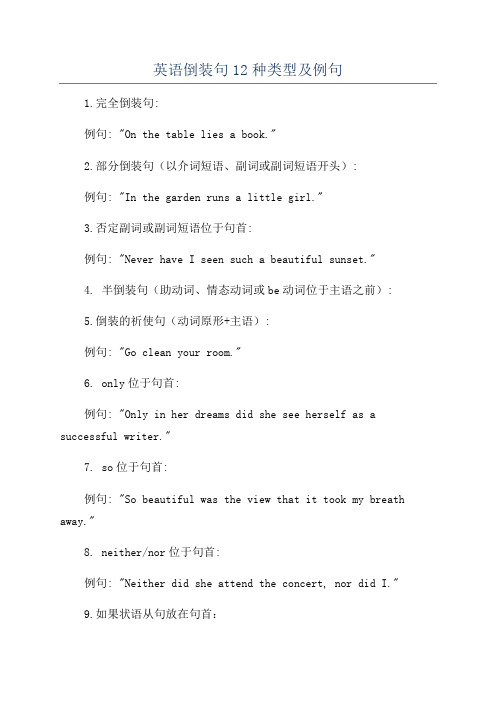
英语倒装句12种类型及例句1.完全倒装句:例句: "On the table lies a book."2.部分倒装句(以介词短语、副词或副词短语开头):例句: "In the garden runs a little girl."3.否定副词或副词短语位于句首:例句: "Never have I seen such a beautiful sunset."4. 半倒装句(助动词、情态动词或be动词位于主语之前):5.倒装的祈使句(动词原形+主语):例句: "Go clean your room."6. only位于句首:例句: "Only in her dreams did she see herself as a successful writer."7. so位于句首:例句: "So beautiful was the view that it took my breath away."8. neither/nor位于句首:例句: "Neither did she attend the concert, nor did I."9.如果状语从句放在句首:10.条件从句位于句首:例句: "Should he fail the exam, he will have to retake the course."11.介词短语或副词短语位于句首:例句: "In the corner sat a small dog."12. or/ nor引导的短语或句子位于句首:。
倒装句
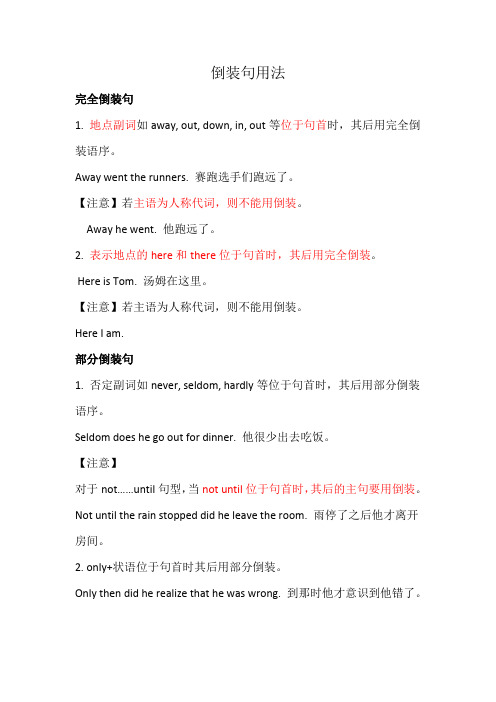
倒装句用法完全倒装句1. 地点副词如away, out, down, in, out等位于句首时,其后用完全倒装语序。
Away went the runners. 赛跑选手们跑远了。
【注意】若主语为人称代词,则不能用倒装。
Away he went. 他跑远了。
2. 表示地点的here和there位于句首时,其后用完全倒装。
Here is Tom. 汤姆在这里。
【注意】若主语为人称代词,则不能用倒装。
Here I am.部分倒装句1. 否定副词如never, seldom, hardly等位于句首时,其后用部分倒装语序。
Seldom does he go out for dinner. 他很少出去吃饭。
【注意】对于not……until句型,当not until位于句首时,其后的主句要用倒装。
Not until the rain stopped did he leave the room. 雨停了之后他才离开房间。
2. only+状语位于句首时其后用部分倒装。
Only then did he realize that he was wrong. 到那时他才意识到他错了。
3. 当not only……but also……位于句首时,not only后的句子通常用部分倒装。
Not only did he speak more correctly, but he spoke more easily. 不仅他讲的更正确,他讲得更不费劲了。
“倒装句”考点精讲英语句子的正常语序是主语在前,谓语在后。
但是有的时候为了表达的需要,比如为了强调、为了保持句子的平衡或者是固定的句型结构等等,而把谓语放在了主语的前面,这种语序就是倒装语序。
倒装又可以分为全部倒装和部分倒装。
一、全部倒装全部倒装是指整个谓语部分都放在主语之前。
全部倒装经常用在谓语动词是be动词的疑问句中,或者是副词词组、分词词组以及介词词组放在句首所使用的倒装。
英语倒装句结构

英语倒装句结构英语句子表达的基本语序是“主语+谓语”。
但在实际应用中,因语法结构的需要,或是为了强调,常把谓语移到主语之前,称为倒装。
英语的倒装结构有两种,其中较为常见的是部分倒装,即谓语的一部分移到主语之前。
如:Only when the war was over could he begin to work again.只有在战争结束后他才能够重新开始工作。
另一种倒装是完全倒装结构,即把谓语的全部都移到主语之前。
如:1.Here comes the bus.公共汽车来了。
2.“But what the child said is true.” said the father.“可是孩子的话是对的。
”父亲说。
下面详细归纳几种常用的倒装结构。
1、几种常见的部分倒装布局:1.Only+状语或者状语从句放在句首。
如:Only in this way can we improve our English.只有这样,我们才能提高英语水平。
Only after you left did l find this bag.只是在你分开当前我才发觉这只提包。
2.含否定意义并修饰全句的词放在句首。
如:not,little, hardly, scarcely,no more, no longer, in no way, never, seldom, not only, no sooner等等。
如:1)Seldom do I go to work by bus.我很少乘大众汽车上班。
2)Never shall I forget it.我永久不会遗忘这件事。
3)No sooner had I got home than it began to rain.我刚一到家,天就开始下雨。
3.So放在句首,跟在一个肯定句之后,表示前面所述内容也适用于另一人或物。
如:1)l XXX.我喜欢旅行,他也喜欢。
2)Her XXX.她父亲是位医生,她母亲也是。
文言文倒装句的四种基本句型例句

文言文倒装句的四种基本句型例句1. 何陋之有?这就好比说,哪有什么简陋的呀,简陋就像那没影的鬼,根本不存在!2. 微斯人,吾谁与归?哎呀,要是没有这种人,我就像个没头的苍蝇,跟谁一起混呢?3. 居庙堂之高则忧其民,处江湖之远则忧其君。
就好像人在高高的庙堂上,就像站在云端的大仙得担忧百姓;在远远的江湖,就像在天涯海角的孤狼还得操心君主。
4. 宋何罪之有?宋国能有啥罪?它的罪就像那不存在的兔子角一样。
5. 忌不自信。
邹忌这家伙,不相信自己,他就像个不敢照镜子的胆小鬼。
6. 马之千里者。
能跑千里的马,那可是马中的豪杰,像会飞的龙一样。
7. 全石以为底。
把整块石头当作底,这就好比拿一座小山做地基。
8. 何厌之有?哪有什么满足的时候?满足就像天边那抓不到的彩虹。
9. 彼且奚适也?他将要到哪里去呢?他就像个没方向的风筝到处乱飘。
10. 渺渺兮予怀。
我的心怀是那么渺茫,就像那无尽大海上的一叶扁舟。
11. 谁为大王为此计者?是谁给大王出这个主意的呢?这人就像个出坏点子的小恶魔。
12. 句读之不知,惑之不解。
不知道句读,解不开疑惑,就像个找不到路的小迷糊。
13. 无乃尔是过与?恐怕该责备你了吧?你就像个做错事还不自知的小笨蛋。
14. 蚓无爪牙之利,筋骨之强。
蚯蚓没有锋利的爪牙,强壮的筋骨,它就像个没武器的小战士。
15. 大王来何操?大王来的时候带了什么呀?就像问一个出门旅游却两手空空的人。
16. 长安君何以自托于赵?长安君凭什么在赵国立足呢?他就像个没根基的浮萍。
17. 豫州今欲何至?刘备现在想要到哪里去呢?他就像个没目的地乱转的小蚂蚁。
18. 安在公子能急人之困也?公子能解救别人困难的精神在哪里呢?这精神就像消失的魔法一样。
- 1、下载文档前请自行甄别文档内容的完整性,平台不提供额外的编辑、内容补充、找答案等附加服务。
- 2、"仅部分预览"的文档,不可在线预览部分如存在完整性等问题,可反馈申请退款(可完整预览的文档不适用该条件!)。
- 3、如文档侵犯您的权益,请联系客服反馈,我们会尽快为您处理(人工客服工作时间:9:00-18:30)。
倒装句型的用法倒装句分为全部倒装和部分倒装1.倒装句之全部倒装全部倒装是________________________________________。
此结构通常只用什么时态________________________。
常见的结构有:1)here, there, now, then, thus等副词置于句首, 谓语动词常用be, come, go, lie, run等表示来去或状态的动词。
Then came the chairman. 你的信。
_______________________ 2)表示运动方向的副词或地点状语置于句首,谓语表示运动的动词。
Out rushed a missile from under the bomber.前面坐着一个老妪。
___________________________________注意:上述全部倒装的句型结构的主语必须是名词,如果主语是人称代词则不能完全倒装。
Here he comes. 他们走开了。
___________________________ 2. 倒装句之部分倒装部分倒装是指________________________________________如果句子的谓语没有助动词或情态动词,则需__________________________ 1. 句首为否定或半否定的词语,如no, not, never, seldom, little, hardly, at no time, in no way, not until…等。
Never have I seen such a performance. Nowhere will you find the answer to this question.母亲一直到孩子入睡后离开房间。
________________________________________________________当Not until引出主从复合句,主句倒装,从句不倒装。
注意:如否定词不在句首不倒装。
I have never seen such a performance.---never____________________________________.The teacher didn’t leave the classroom until all the students left .--not until ____________________________________________.典型例题1)Why can\'t I smoke here? At no time___ in the meeting-room A. is smoking permitted B.smoking is permittedC. smoking is it permittedD.does smoking permit2)Not until the early years of the 19th century ___ what heat is.A. man did knowB. man knowC. didn\'t man knowD. did man know3. 以否定词开头作部分倒装如Not only…but also, Hardly/Scarcely…when, No sooner…than等,要倒装。
他没有收下礼物,还狠狠批评了送礼的人。
_____________________________________________________ Hardly had she gone out when a student came to visit her.用no sooner ….than 改写句子_________________________________ 典型例题No sooner___ than it began to rain heavily.A. the game beganB.has the game begunC. did the game beginD.had the game begun注意:只有当Not only…but also连接两个分句时,才在第一个分句用倒装结构。
如果置于句首的Not only…but also仅连接两个并列词语,不可用倒装结构,如Not only you but also I am fond of music。
4 . so, neither, nor作部分倒装用这些词表示\"也\"、\"也不\" 的句子要部分倒装。
Tom can speak French. So can Jack.你不去,我也不去。
_______________________________典型例题---Do you know Jim quarrelled with his brother? ---I don\'t know, _____.A. nor don\'t I careB. nor do I careC. I don\'t care neitherD. I don\'t care alsoTom asked me to go to play football and so I did. 汤姆邀我去踢球,我去了。
---It\'s raining hard.---_________(是呀)5. only在句首倒装的情况。
只有这样,你才能学好英语。
___________________________________ 6.Only after being asked three times did he come to the meeting.如果句子为主从复合句,则主句倒装,从句不倒装。
病得狠重时,他才卧床休息。
__________________________________________________7. as, though 引导的倒装句as / though引导的让步从句必须将表语或状语提前(形容词, 副词, 分词, 实义动词提前)。
但需注意:1)句首名词不能带任何冠词。
Little girl though she is, she could do lots of housework.2)句首是实义动词, 其他助动词放在主语后。
如果实义动词有宾语和状语,随实义动词一起放在主语之前。
Try hard as he will, he never seems able to do the work satisfactorily.注意:让步状语从句中,有though,although时,后面的主句不能有but,但是though 和yet可连用。
8. 其他部分倒装1)so…that 句型中的so 位于句首时,需倒装。
So frightened was he that he did not dare to move an inch.2)在某些表示祝愿的句型中。
May you all be happy.3)在虚拟语气条件句中从句谓语动词有were, had, should等词,可将if 省略,把were, had, should 移到主语之前,采取部分倒装。
Had I been to America, I would speak English smoothly.Not until I began to work ___ how much time I had wasted.A. didn\'t I realizeB. did I realizeC. I didn\'t realizeD. I realize倒装句练习题1. _____can you expect to get a pay rise.A. With hard workB. Although work hardC. Only with hard workD. Now that he works hard2. Seldom ____ any mistakes during my past few years of working here.A. would I makeB. did I makeC. I did makeD. shall I make3. Not until all the fish died in the river, _____ how serious the pollution was.A. did the villagers realizeB. the villagers realizedC. the villagers did realizeD. didn’t the villagers realize4. Not until I began to work ____ how much time I had wasted.A. didn’t realizeB. did I realizeC. I didn’t realizeD. I realized5.—Do you know Jim quarrel with his brother? —I don’t know, _______.A. nor don’t I careB. nor do I careC. I don’t care neitherD. I don’t care also6. Only by practicing a few hours every day _____ be able to waste much time.A. you canB. can youC. you willD. will you7. Not until the early years of the19th century ___ what heat is.A. man did knowB. man knewC. didn’t man knowD. did man know8. _____got into the room, _____ the telephone rang.A. He hardly; thenB. Hardly had he; whenC. He had not; thanD. Not had he; when9. ______ snacks and drinks,but they also brought cards for entertainment when they had a picnic in the forest. A. Not only they brought B. Not only did they bringC. Not only brought theyD. Not only they did bring10.—I don’t think I can walk any further. —_____, Let’s stop here for a rest.A. Neither can IB. Neither do IC. I didn’t think soD. I think so11. Only in this way ______ do it well.A. must weB. we couldC. can weD. we can12. Hardly ____ when it began to rain.A. had he arrivedB. arrived heC. he had arrivedD. did he arrive13. Only when you have finished your homework ___ go home.A. can youB. would youC. you willD. you can14. ______, I would have given you his address.A. If you asked meB. You had asked meC. Should you have asked meD. Had you asked me15. Only when class began ___ that he had left his book at home.A. will he realizeB. he did realizeC. did he realizeD. should he realize16. ______ that I couldn’t be absorbed in the work.A. They made such talkedB. So loudly they talkedC. It was noise outsideD. Such a loud noise did they make17. Many a time _____ me good advice.A. he gaveB. does he giveC. he has givenD. has he given18. ____ have I seen a better performance.A. EverywhereB. somewhereC. Everywhere elseD. Nowhere19. Not a single word ____ at the beginning.A. did he sayB. has he saidC. he saidD. he has said20. Only in an hour ago ____ out why he was absent.A. did the teacher foundB. the teacher foundC. did the teacher findD. had the teacher found21. _____the plane. A. Flew down B. Down flew C. Down was flying D. Down fly22. Hardly _____ when the bus suddenly pulled away.A. they had got to the bus stopB. they got to the bus stopC. did they get to the bus stopD. had they got to the bus stop23. ______ I had time, I would have run round that lake again. A. If B. Unless C. Had D. When24. Not only ______ a promise, but he also kept it.A. had he madeB. he had madeC. did he makeD. he makes25. There ____ . A. come they B. they come C. they are come D. they will come26. ______ that he could not speak for a long time.A. So frightened was heB. So frightened he wasC. Was he so frightenedD. Frightened was he Exercise for Inversion1.Only when you have obtained sufficient data ______ come to a sound conclusion.A. can youB. you canC. would youD. you would2.______ that this region was so rich in natural resources. A. Little he knew B.Little did he knowC. Little he did knowD. Little he had known3.Never again ______ political office after his 1928 defeat for the presidency.A. Alfred E.Smith seriously soughtB. seriously Alfred E.Smith soughtC. when did Alfred E.Smith seriously seekD. did AlfredE.Smith seriously seek4.Only in recent years ______ begun to realize that wild dogs, kept within bounds, often do more good than harm. A. people have B. since people have C. have people D. people who have5.Not until I shouted at the top of my voice ______ his head.A. that he turnedB. did he turnC. he didn’t turnD. he had turned6.______ received law degrees as today.A. Never so women haveB. The wome n aren’t everC. Women who have neverD. Never have so many women7. Not only _______ about the food, he also refused to pay for it.A. the customer complainedB. when the customer complainedC. did the customer complainD. the customer did complain8. ______ that they may eventually reduce the amount of labor needed on construction sites by 90 percent. A. Such construction robots are clever B. So clever the construction robots areC. So clever are the construction robotsD. Such clever construction robots are9.______ do we go for picnics. A. Certainly B. Sometimes C. Seldom D. Once10.Her answer is not acceptable, and ______.A. neither am IB. either is mineC. neither is mineD. mine is neither11.So fast ______ that it is difficult for us to imagine its speed.A. light travelB. travels the lightC. do light travelD. does light travel12.Smith is a good student and studies very hard, _________.A. so it is with MaryB. so does MaryC. so is MaryD. neither does Mary13.______ a little more time to think, he might have acted more sensibly.A. If he tookB. If he has takenC. Had he takenD. Should he take14.Beneath our feet ______ that our life depends on for food and clothing.A. the earth layB. the earth liesC. lie the earthD. lies the earth15.Our eating habits have changed, __________ our way of life, and the fuel we need for our bodies is also different. A. so is B. as has C. which has D. the same is16._____ the beginning of the 19th century did scientists know that all matter is made up of atoms.A. AtB. ByC. Up toD. Not until17.Hardly ______ he got out of the court ______ the reporters raised a lot of questions to him.A. had … whenB. had…thanC. did…whenD. has…than18. Many a time ______ swimming alone.A. the boy wentB. went the boyC. did the boy goD. did go the boy19.Important ___ his discovery was, it was regarded as a matter of no account in his time.A. toB. forC. asD. although20.According to the periodic table, ______ still some elements undiscovered.A. there seem to beB. it seemsC. it seems to beD. here seems21.Here ______ you want to see.A. the manager comesB. comes the managerC. comes a managerD. is coming a manager22.Barry can hardly drive a car, ______.A. so can’t MollyB. can’t Molly eitherC. Molly can’t tooD. neither can Molly23._______ for the leadership of the Party, we should not have succeeded.A. Had not it beenB. Had it not beenC. There wasD. Is there24.______ no air or water, there would be no life in the world.A. Were thereB. There areC. There wasD. Is there25.Not only ______ the data fed into it, but it can also analyze them.A. the computer can memorizeB. can the computer memorizeC. do the computer memorizeD. can memorize the computer26.Not once ______ his view of life.A. did the gentleman mentionB. the gentleman mentioned thatC. the gentleman mentionedD. does gentleman mentioned27.By no means ______ their own language well.A. it is true that all English people knowB. is it true that do all English people knowC. it is true that do all English people knowD. is it true that all English people know28. No sooner ______ the theatre than the film Tony began.A. reachedB. had I reachedC. I had reachedD. did I reach29.The world’s birth rates are on a decline and ______ are the death rates.A. soB. alsoC. tooD. the same30.Typical of the new type of young people _____, who set a shining example to the whole nation.A. was Lei FengB. were Lei FengC. Lei Feng wasD. Lei Feng were31.__________ for the free tickets, I would not have gone to see the films so often.A. If it is notB. Were it notC. Had it not beenD. If they were not32.She didn’t want to buy it, ______. A. however good was it B. however good it wasC. for how good might it beD. for how good it might be33.______ , it is always possible to find out its volume.A. Whatever the shape of a body may beB. The shape of a body may be whateverC. May whatever the shape of a body beD. Whatever may the shape of a body be参考答案1.倒装句,答案为C。
